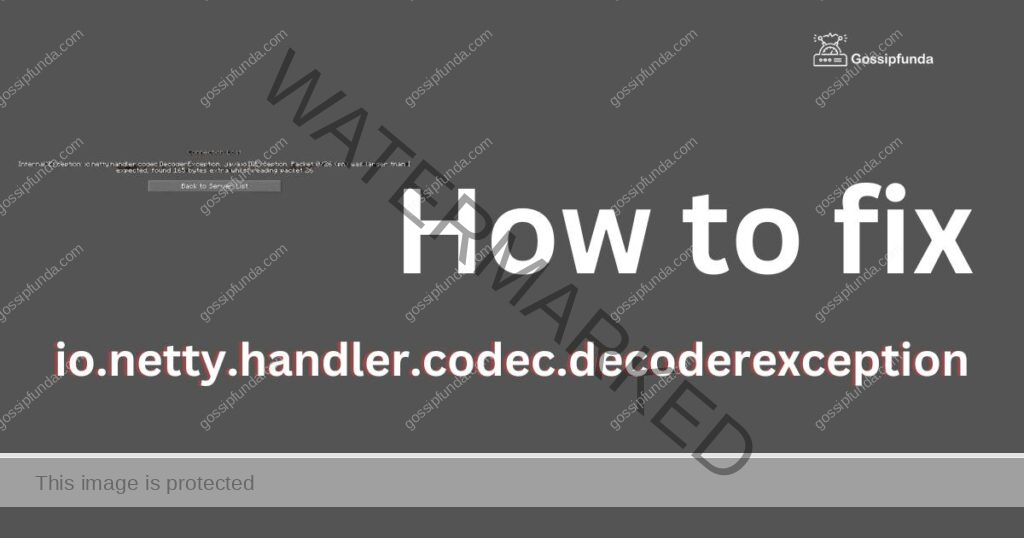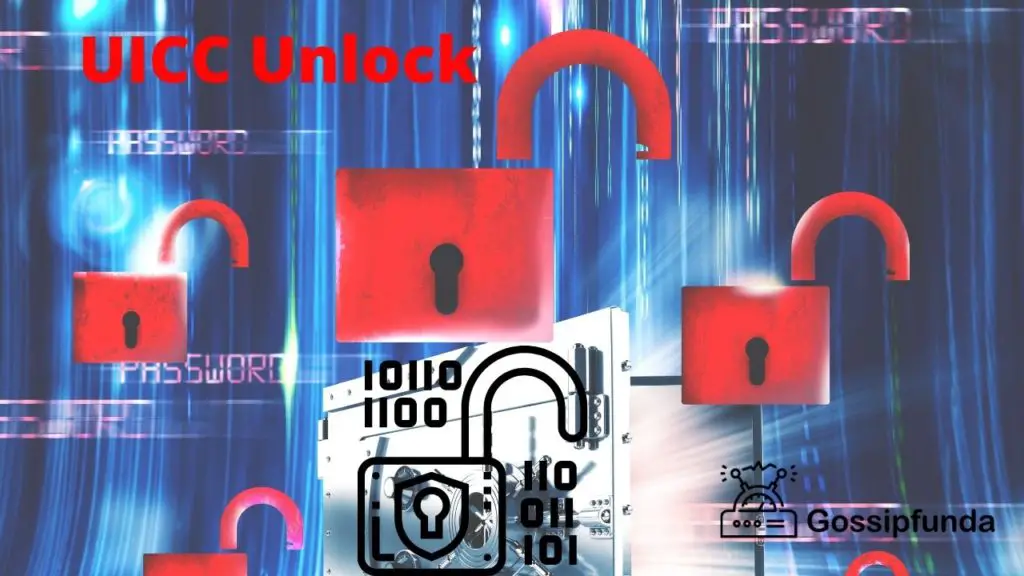Data encoding and decoding activities are frequently handled by libraries and frameworks in Java programmes that include network connectivity. The Netty library is a well-liked option for creating network applications in Java. As a result of its event-driven, asynchronous, and scalable networking capabilities, Netty is frequently used to create high-performance network applications. Netty, like any software, might have issues, and one typical issue that programmers could run across is the “Internal Exception io.netty.handler.codec.DecoderException.” We shall examine the nature of this mistake, its likely causes, and potential fixes in this post.

Overview of Internal Exception io.netty.handler.codec.DecoderException
The “Internal Exception io.netty.handler.codec.DecoderException” When there is a problem decoding data from a network channel, Netty’s decoder classes will throw an exception called. Netty employs decoders to transform the network’s raw binary data into higher-level data types that the application can use. The data must be parsed and interpreted by decoders in accordance with a predetermined protocol or format. A DecoderException is produced to indicate that the decoding process has failed when there is a problem with the data being received or the decoding logic being applied.
Causes:
Distorted or flawed data
A DecoderException may be thrown if the network data being received is damaged or faulty. If the data is not correctly prepared in accordance with the anticipated protocol or encoding, this may occur. A decoding mistake may occur, for instance, if a binary protocol is employed but the received data is not in the proper binary format.
Incorrect decoder setup
A DecoderException may occur if the decoder is not set up appropriately to process the data being received. This could happen if the received data does not conform to the format or protocol that the decoder was expecting. Decoding errors may occur, for instance, if the decoder is set up to assume data in UTF-8 encoding but the data actually received is in another encoding.
Protocols or data types that are not supported
A DecoderException may be raised if the decoder is not intended to handle specific data types or protocols. Decoding errors may occur, for instance, if the decoder anticipates data in a certain format, such as JSON or XML, but the data actually received is in another format.
Decoder logic flaws
A DecoderException may be generated if the application developer’s proprietary decoder logic has faults or problems. This could happen if the decoder implementation has logical problems, null pointer exceptions, or other coding issues. Decoding errors may occur, for instance, if the decoder logic has a fault that prevents it from handling every circumstance correctly.
Incorrect decoder use
A DecoderException may result from improper usage of the decoder in the programme. This may occur if the pipeline does not have the decoder correctly registered or if it is being utilized improperly. A decoding mistake could occur, for instance, if the decoder is used to decode data from one channel or protocol but is really designed to decode data from another channel or protocol.
Netty library version that is incompatible
A DecoderException may be thrown if the application’s version of the Netty library is incompatible with the decoder’s settings or method of use. This could happen if the decoder depends on features or bug patches that are only present in a certain Netty library version.
Network problems
A DecoderException may occur if there are problems with the network connection, such as packet loss, excessive latency, or erratic data transfer. This could occur if there are network outages or data discrepancies that prevent the decoder from correctly interpreting the data, leading to a decoding error.
Mismatched encoding and decoding
A DecoderException may occur if the encoding and decoding logic employed on the sender and recipient sides of the connection are inconsistent. A decoding error may arise if the sender encodes data using a certain format or protocol but the receiver’s decoder is not set up to support that format or protocol.
Incorrect data entered
A DecoderException may be thrown if the input data being supplied to the decoder is invalid, such as null or empty data. Decoding errors might arise if the application does not correctly check or sanitize the input data before sending it to the decoder.
How to fix internal exception io.netty.handler.codec.decoderexception?
Verify the input data
Make that the input data being sent to the decoder is accurate and structured correctly in accordance with the desired protocol or encoding. To avoid decoding problems, thoroughly validate and sanitize the input data before sending it to the decoder.
Improve memory utilization
Maximize memory consumption during decoding to avoid out-of-memory issues that could cause decoding issues. Refrain from allocating or copying memory without a need, and immediately release any unneeded memory resources.
Examine the settings for the network
Check the network parameters, including buffer sizes, timeouts, and other settings, to make sure they are configured correctly and adhere to the decoder’s requirements. Decoding mistakes may occur as a result of improper network setups.
Test with several scenarios
To find any potential problems or edge situations that might result in the decoding mistake, test the application using various scenarios, data formats, protocols, and network configurations. To completely verify the decoder’s functioning, use extensive testing methods including unit testing, integration testing, and stress testing.
Netty library upgrade
Make that the decoder setup and use are compatible with the Netty library version being used. Try updating to the most recent Netty library release, which can include patches for the decoding problem or other enhancements.
Dealing with network interruptions
Consider addressing network problems including packet loss, excessive latency, or erratic data transfer. Use the right error handling and recovery procedures in the programme to manage network outages politely and avoid decoding mistakes.
Put length or data-size restrictions in place
Implement the appropriate checks and validation to make sure that the received data does not exceed the decoder’s permitted limits if it has any restrictions on the maximum amount or length of data that it can handle. To avoid coding mistakes, handle big data with elegance.
Concurrent access synchronization
Provide appropriate synchronization techniques to maintain thread safety and prevent race circumstances or other concurrency-related problems that might result in decoding errors if the decoder is accessed concurrently by several threads or portions of the application.
Keep track of system resources
See how the decoder performs in relation to system resources like memory utilization, CPU usage, and other runtime circumstances. Ascertain that the system has enough resources to handle the decoding operation, and respond appropriately if there are any resource limits.
Utilize the right data structures
During the decoding process, save the data in the proper data structures and buffers and handle it accordingly. Decoding mistakes can be caused by out-of-date or ineffective data structures that might affect memory or performance.
Examine the systems for managing errors
Check that the application’s error handling procedures are implemented correctly and account for all potential situations. To avoid decoding mistakes, use proper error-handling strategies including logging, exception handling, and gentle degradation.
Conclusion
The “Internal Exception io.netty.handler.codec.DecoderException “When there is a problem decoding data from a network channel, error might appear in Java programmes that utilise the Netty library for network communication. Several things, such as bad or damaged data, mismatched decoder settings, invalid data types or protocols, or logical flaws in the decoder, might contribute to this issue. Debugging and troubleshooting must be done thoroughly to find and resolve the root cause of this problem. Developers can successfully handle the DecoderException and ensure that their Java network applications run without a hitch by checking the accuracy of the data, going over the decoder configuration, handling unsupported data types or protocols, debugging the decoder logic, updating the Netty library, and adhering to best practises for network communication.
Must read: io.netty.channel.abstractchannel$annotatedconnectexception
FAQs
Absolutely, decoding issues may occur if the Netty library or any of its components are implemented incorrectly.
Decoding issues can occur if there is a problem with SSL/TLS encryption or decryption during the encoding or decoding process.
Decoding mistakes might happen if there is a problem with data integrity verification or checksum validation during the encoding or decoding process.
Certainly, a network outage or a high delay might cause the decoder to receive incorrect or incomplete data, which causes the error.
Divyansh Jaiswal is a B.Tech graduate in Computer Science with a keen interest in technology and its impact on society. As a technical content writer, he has several years of experience in creating engaging and informative content on various technology-related topics.
Divyansh’s passion for writing and technology led him to pursue a career in technical writing. He has written for various publications and companies, covering topics such as cybersecurity, software development, artificial intelligence, and cloud computing.
Apart from writing, Divyansh is also interested in exploring new technologies and keeping up with the latest trends in the tech industry. He is constantly learning and expanding his knowledge to provide his readers with accurate and up-to-date information.
With his expertise in both technology and writing, Divyansh aims to bridge the gap between complex technical concepts and the general public by creating easy-to-understand content that is both informative and enjoyable to read.


